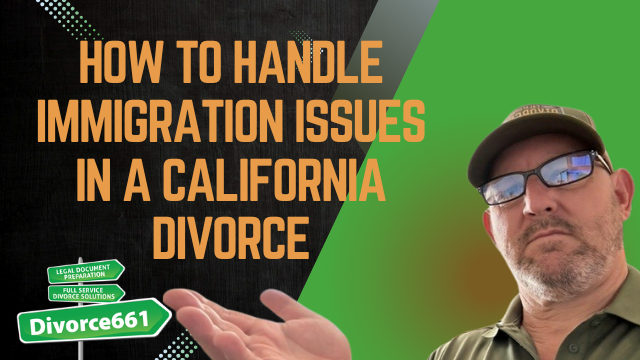How to Handle Immigration Issues in a California Divorce
If you or your spouse is not a US citizen and you are going through a divorce in California, you probably have questions about how divorce will affect immigration status. This is a common concern in Los Angeles and across the state. Divorce does not automatically cancel someone’s immigration status, but it can complicate pending applications and raise additional scrutiny from immigration authorities. Here is what you need to know and practical steps to protect your status while moving forward with your divorce.
How divorce can affect immigration status
Divorce itself does not immediately revoke a noncitizen spouse’s lawful status. However, the timing of a divorce in relation to immigration applications matters a great deal.
- Pending marriage-based green card: If someone is in the United States on a marriage-based green card application and the divorce is filed before the green card is approved, that pending application can be denied because the petition was based on the marriage.
- Already issued green card: If the green card has already been issued, divorce does not automatically cancel it. But if the divorce happens early in the conditional or probationary period, immigration authorities may review the case more closely to ensure the marriage was entered into in good faith.
- Conditional green card (2-year conditional residency): Conditional permanent residents receive a 2-year card and must file to remove conditions before it expires. If the couple divorces before the conditions are removed, the foreign national may need to seek a waiver to remove conditions by establishing that the marriage was bona fide or that other qualifying circumstances exist.
Common scenarios and what to expect
Here are a few common situations you might encounter and how immigration typically responds.
- Application dependent on current spouse: Many marriage-based petitions depend on the sponsoring spouse remaining in the picture. If that relationship ends before final approval, the basis for the petition can disappear.
- Increased evidence requests: If divorce occurs soon after a green card is issued or while an application is pending, USCIS may request additional proof that the marriage was genuine and not entered into for immigration purposes.
- Waivers and exceptions: There are legal paths to preserve status in certain cases, such as filing for a waiver when conditions must be removed and the marriage has ended. These typically require documentation showing the marriage was in good faith.
Real client example
We recently worked with a client whose spouse held a conditional green card. They were divorcing before the two-year mark and were worried about losing legal status. We advised them to consult an experienced immigration attorney. Together, they filed a waiver demonstrating the marriage was entered into in good faith. The waiver allowed the spouse to keep their status even after the divorce.
Practical steps to protect immigration status during a divorce
If immigration is part of your divorce case, take these steps as soon as possible.
- Get an immigration attorney involved early: Immigration law is complex and timing sensitive. An immigration attorney can assess your situation, identify deadlines, and prepare any necessary petitions or waivers.
- Gather evidence of a bona fide marriage: Documents that show the marriage was real are critical. Examples include joint bank accounts, leases or mortgage documents, insurance policies, photos, affidavits from friends and family, and correspondence showing a shared life.
- Coordinate between divorce and immigration lawyers: Your divorce attorney should work with the immigration attorney so that filings and timelines do not conflict and so immigration concerns are addressed in the divorce process.
- Do not assume status ends with divorce: Existing lawful permanent residents generally keep their status unless immigration authorities revoke it. Pending applications, however, are vulnerable if the basis for the application disappears.
- File waivers or other petitions promptly: If you are a conditional resident or have a petition tied to your marriage, there are specific forms and deadlines. Acting quickly improves the chance of a favorable outcome.
Frequently asked questions
Does divorce automatically cancel a green card?
No. Divorce does not automatically cancel an issued green card. However, USCIS may review the case, especially if the divorce occurs soon after the green card was granted or while an application is pending.
What happens to a conditional green card if the couple divorces?
Conditional residents must file to remove conditions, usually within 90 days before the two-year card expires. If the marriage has ended, the conditional resident may seek a waiver of the joint filing requirement by proving the marriage was entered into in good faith or by demonstrating other qualifying circumstances. An immigration attorney can advise on the best strategy and help prepare the necessary evidence.
Should I involve an immigration attorney during my California divorce?
Yes. When immigration status is involved, it is important to have an immigration lawyer review your case alongside your divorce attorney. They will help protect your legal status while your divorce moves forward.
How we can help
We handle the California divorce side of the process and coordinate closely with experienced immigration attorneys when immigration is involved. That coordination ensures your legal status is protected and that your divorce proceeds smoothly. If you are dealing with immigration issues during a California divorce, schedule a free consultation to discuss your situation and learn your options.
Visit divorce661.com to schedule your free consultation. We will walk you through the divorce process and connect you with the right resources to protect your future.

